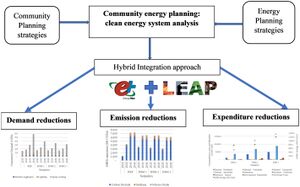
Community-scale energy planning entails concerted efforts for realizing localized energy and emission plans geared towards achieving energy sustainable communities. This is largely under-investigated for the developing world together with exploring the synergies between community planning and energy planning strategies. This study performs community-scale energy planning from 2015 to 2040 for Onyen-okpon and Giere, two rural communities in Nigeria. Utilizing the hybrid integration approach with the Low Emissions Analysis Platform model, the study investigates the implications for transforming rural communities to sustainable renewable based energy supply and quantitatively analyses the strategy integration based on four scenarios: the reference scenario and three composite demand side management scenarios. The results show that the integration of strategies has clear benefits with the composite scenarios availing reduced energy use with significant reductions in energy demand and greenhouse gases emissions. The third demand side management scenario provides the best performance among the composite scenarios in terms of demand and emissions reductions, energy conservation, and overall reduction in energy expenditures. The integration approach provides useful insights for design and implementation of localised energy policies across different sectors in the community where productive uses are taken into account for clean and sustainable economic production. This avails the opportunity to concurrently define and reach multiple targets, goals and impacts in reducing emissions while ensuring energy access and productive services.
Highlights[edit | edit source]
- Community-scale clean energy planning performed with LEAP.
- Hybrid variant energy system modelling is demonstrated for developing countries.
- Quantitative analysis is performed for exploring the possible synergies of community and energy planning strategies.
- Systems use bioenergy and solar photovoltaic hybrids and reference scenario, and three demand side managements ones were investigated.
- Composite scenarios offers significant reductions in energy demand and GHGs emissions.
See also[edit | edit source]
- Adapting the European typology approach for building stock energy assessment (TABULA) concept for the developing world: The Nigerian case study
- Demonstration of the integrated rural energy planning framework for sustainable energy development in low-income countries: Case studies of rural communities in Nigeria
- Decentralized Renewable Hybrid Mini-Grids for Rural Communities: Culmination of the IREP Framework and Scale up to Urban Communities
- Economic viability of captive off-grid solar photovoltaic and diesel hybrid energy systems for the Nigerian private sector
- Simulations of Greenhouse Gas Emission Reductions from Low-Cost Hybrid Solar Photovoltaic and Cogeneration Systems for New Communities
- Achieving 100% Renewable and Self-Sufficient Electricity in Impoverished, Rural, Northern Climates: Case Studies from Upper Michigan, USA
- A Free and open-source microgrid optimization tool: SAMA the Solar Alone Multi-Objective Advisor
- Residential Sizing of Solar Photovoltaic Systems and Heat Pumps for Net Zero Sustainable Thermal Building Energy





